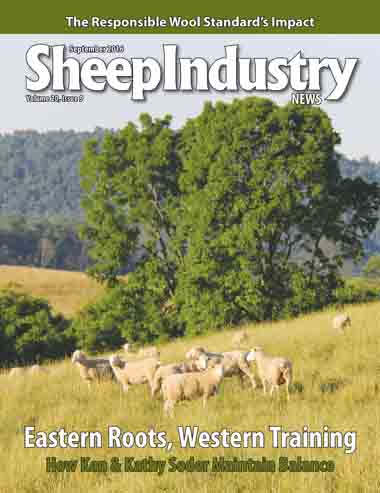
- September 2016
- President’s Notes
- Should Your Wool Be RWS Certified?
- Patagonia Buys American in Wool Restart
- Reporting Rules Show Little Change
- Eastern Roots, Western Training
- Genetic Data Pays Off at Sale Barn
- UK Ovine Genetics Available Again in U.S.
- Polypay Takes on Parasite Study
- Comments Submitted on Uruguay Proposal
- Obituaries
- Market Report
- The Last Word
Comments Submitted on Uruguay Proposal
The U.S. Department of Agriculture’s Animal and Plant Health Inspection Service proposed in July to allow the importation of bone-in ovine meat from Uruguay. A 60-day comment period on the proposal closed on Aug. 30, and ASI submitted comments on behalf of the sheep industry.
“ASI is a proponent of free and fair trade; our borders have generally been open to lamb imports from all qualifying countries, essentially duty and quota free, for decades,” said American Sheep Industry Association President Burton Pfliger. “ASI and its members are interested in and concerned with meat safety, quality and disease risk from all sources of lamb products.”
U.S. borders were open to Uruguay prior to its outbreak of Foot and Mouth Disease 15 years ago in its cattle population. Uruguay is designated FMD-free with vaccination and is currently approved to export deboned lamb to the United States with several FMD risk-mitigation measures in place.
In ASI’s comments, submitted in August, on the proposed rule to allow the importation of bone-in lamb meet from Uruguay, it states: “The proposed rule to allow the importation of bone-in lamb products from Uruguay includes some specific, intriguing FMD risk-control and mitigation measures that we believe could be used rather effectively. Further, Uruguay has a history of a highly functional inspection system. However, we find that some elements of the risk assessments are deficient and that too much time has passed since rigorous FMD risk assessments have been done for them to be used as valid support for the current proposed changes in the import regulations.”
Pfliger further commented, “In conclusion, we appreciate the willingness of Uruguay’s sheep industry participants and of their regulatory agencies to propose to adopt several interlocking measures to help assure that exported lamb meat would not contain FMD virus. However, given the concerns listed, we believe APHIS should withdraw this proposed rule and conduct the following:
A. Conduct a current quantitative and qualitative risk assessment and present the findings in a transparent manner to the public.
B. Re-examine the proposed surveillance-sampling plan including serological sampling tests and protocols with evidence for effectiveness.
Once these tasks are accomplished, APHIS could publish a new proposed rule if warranted by the findings.”
The proposed rule is online at gpo.gov/fdsys/pkg/FR-2016-07-01/pdf/2016-15625.pdf. Submitted comments can be viewed online at www.regulations.gov/#!docketDetail;D=APHIS-2015-0050.

